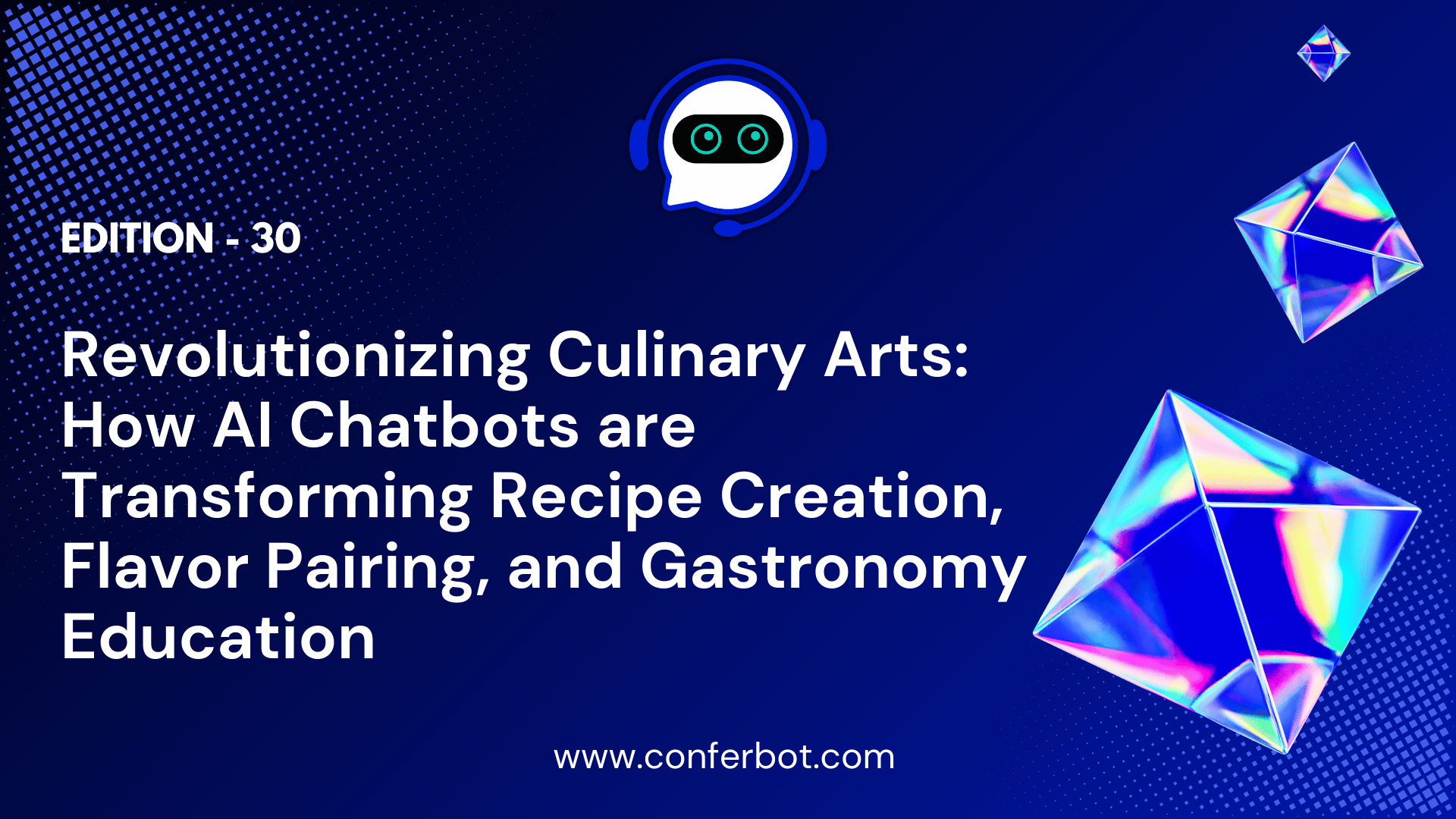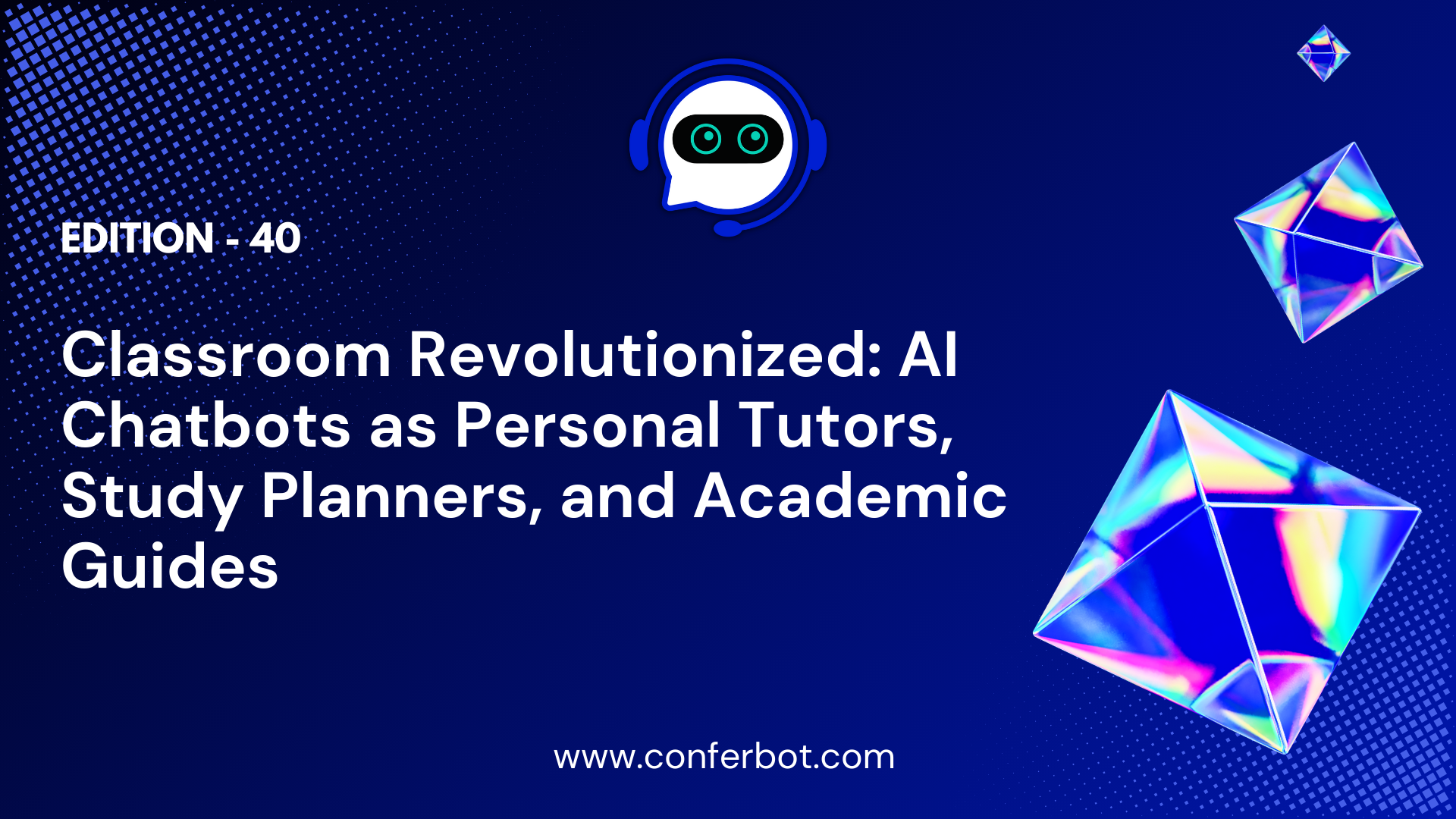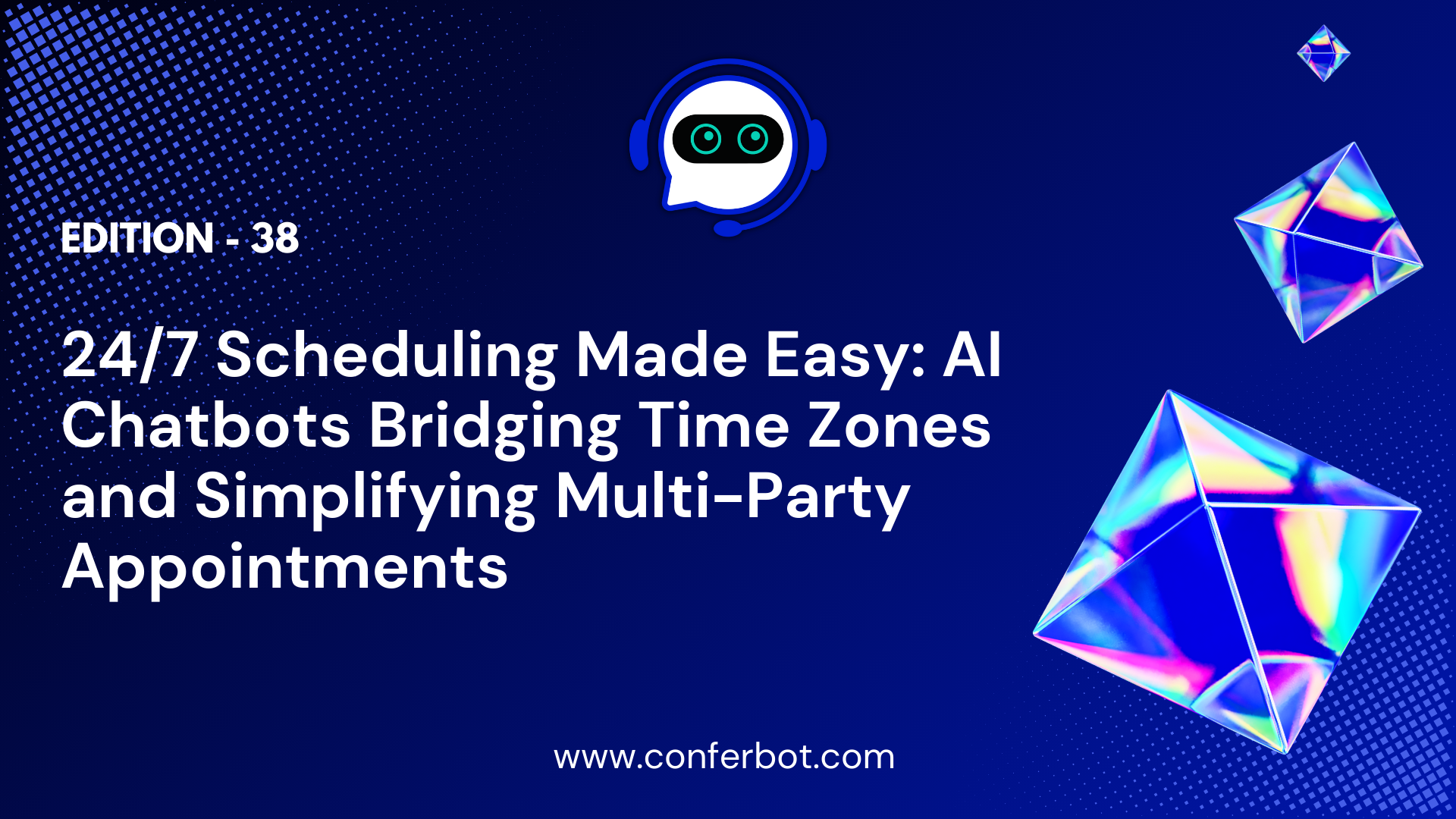
Revolutionizing Culinary Arts: How AI Chatbots are Transforming Recipe Creation, Flavor Pairing, and Gastronomy Education
Discover how AI chatbots are transforming the culinary world, from innovative recipe creation to advanced flavor pairing and interactive gastronomy education. Explore the future of cooking in our latest Insights on Chatbots & AI edition.

Welcome to the thirtieth edition of Insights on Chatbots & AI, where we embark on a delectable journey into the world of culinary arts, reimagined and revolutionized by artificial intelligence. This issue explores how AI chatbots are stirring up innovation in recipe creation, adding spice to flavor pairing, and serving up a new era in gastronomy education. Join us as we savor the flavors of technological advancement that are reshaping the landscape of food and cooking. The kitchen is heating up with a new kind of culinary assistant as AI chatbots take on the role of creative collaborators in recipe development. These digital sous chefs are not just regurgitating existing recipes but are pioneering new frontiers in culinary innovation. AI chatbots excel at analyzing vast databases of recipes, ingredients, and culinary techniques to generate novel recipe ideas. By understanding flavor profiles, nutritional values, and cooking methods, these systems can suggest unique combinations that human chefs might not have considered. For instance, an AI chatbot might propose an unexpected pairing of jackfruit with traditional BBQ spices to create a innovative vegan pulled "pork" dish. The adaptive nature of AI chatbots allows for personalized recipe creation. By considering dietary restrictions, personal preferences, and even the ingredients available in a user's pantry, these digital assistants can craft recipes tailored to individual needs and circumstances. This capability not only enhances the cooking experience but also reduces food waste by utilizing available ingredients efficiently. Moreover, AI chatbots are pushing the boundaries of culinary fusion. By analyzing culinary traditions from various cultures, these systems can suggest cross-cultural recipe innovations that blend flavors and techniques in exciting new ways. This approach not only leads to culinary innovation but also promotes cultural exchange through food. The integration of AI chatbots with smart kitchen appliances is opening new avenues for recipe creation. Imagine a system that can analyze the contents of your smart refrigerator, consider your dietary goals, and then guide you through preparing a meal that is both delicious and aligned with your health objectives. This seamless integration of data and culinary creativity brings us closer to truly personalized cooking experiences. Furthermore, AI chatbots are playing a crucial role in adapting recipes for different cooking methods or dietary needs. They can suggest modifications to turn a traditional oven-baked dish into an air fryer recipe, or provide alternatives to make a classic meal keto-friendly or vegan. This versatility makes gourmet cooking more accessible and adaptable to various lifestyles. In the realm of flavor pairing, AI chatbots are emerging as sophisticated flavor alchemists, uncovering unexpected and delightful combinations that tantalize the taste buds. These digital sommeliers are transforming the way chefs and home cooks approach flavor combinations. AI chatbots leverage complex algorithms to analyze the chemical compounds in different ingredients, identifying complementary flavors that might not be obvious to the human palate. By processing data on thousands of flavor compounds and successful pairings, these systems can suggest innovative combinations like strawberry and basil, or chocolate and blue cheese, expanding the horizons of culinary creativity. The predictive capabilities of AI chatbots in flavor pairing are particularly valuable in the beverage industry. These systems can recommend unique cocktail recipes, suggest wine pairings for complex dishes, or even assist in creating new flavor profiles for craft beers. This application of AI is not only enhancing the dining experience but also driving innovation in the beverage sector. In the world of molecular gastronomy, AI chatbots are becoming indispensable tools. They can analyze the chemical properties of ingredients and suggest innovative techniques to transform textures and flavors. For example, an AI system might propose using liquid nitrogen to create a frozen olive oil "snow" to complement a savory dish, pushing the boundaries of culinary physics. Moreover, AI chatbots are revolutionizing the approach to balancing flavors in complex dishes. By understanding the interplay of sweet, sour, salty, bitter, and umami tastes, these systems can guide chefs in achieving perfect flavor harmony. They can suggest precise adjustments to recipes, like adding a touch of acidity to balance a rich sauce or incorporating a umami element to enhance a vegetarian dish. The application of AI in flavor pairing extends to addressing dietary restrictions and preferences. These chatbots can suggest flavor alternatives for individuals with allergies or specific dietary needs, ensuring that restricted diets don't mean restricted flavor experiences. For instance, they might recommend nutritional yeast to add a cheesy flavor to vegan dishes or suggest soy-free alternatives to achieve umami in Asian-inspired cuisine. Furthermore, AI chatbots are playing a role in rediscovering and reimagining traditional flavor pairings. By analyzing historical recipes and regional culinary practices, these systems can suggest modern twists on classic combinations, breathing new life into traditional cuisines while respecting their cultural roots. The world of culinary education is being transformed by AI chatbots, which are serving as tireless tutors, providing personalized instruction and bringing the expertise of world-class chefs to kitchens around the globe. These digital educators are making gastronomy education more accessible, interactive, and tailored to individual learning styles. AI chatbots excel at breaking down complex culinary techniques into easy-to-follow steps. They can provide real-time guidance as students practice knife skills, explain the science behind emulsification in sauce-making, or offer tips on achieving the perfect sear on a steak. This step-by-step approach, coupled with the ability to answer questions instantly, creates a supportive learning environment for aspiring chefs. The adaptive learning capabilities of AI chatbots are particularly valuable in culinary education. These systems can assess a student's skill level, identify areas for improvement, and create personalized learning paths. For example, if a student struggles with pastry techniques, the chatbot can provide additional exercises and explanations focused on baking and patisserie. Virtual cooking classes led by AI chatbots are democratizing access to culinary education. These platforms can simulate kitchen environments, demonstrate techniques through augmented reality, and even provide feedback on a student's progress by analyzing photos or videos of their dishes. This technology makes it possible for anyone with a smartphone to access high-quality culinary instruction. In professional culinary schools, AI chatbots are complementing traditional instruction methods. They can provide additional support outside of class hours, offer practice quizzes on food safety and culinary theory, and even assist in menu planning exercises. This blended learning approach enhances the educational experience and prepares students for the technology-integrated kitchens of the future. Moreover, AI chatbots are playing a crucial role in preserving and sharing culinary heritage. By analyzing traditional recipes and techniques from various cultures, these systems can offer lessons in authentic ethnic cuisines, helping to keep traditional cooking methods alive and accessible to new generations of cooks. The integration of AI chatbots with smart kitchen devices is creating new possibilities for hands-on learning. Imagine a system that can guide a student through a recipe, adjusting cooking temperatures based on real-time feedback from smart appliances, and offering advice on plating and presentation. This interactive, tech-enabled approach to culinary education bridges the gap between theory and practice. Furthermore, AI chatbots are revolutionizing the way aspiring chefs learn about ingredient sourcing and sustainability. These systems can provide up-to-date information on seasonal ingredients, explain the environmental impact of different food choices, and offer guidance on sustainable cooking practices, fostering a new generation of environmentally conscious culinary professionals. As we embrace the transformative potential of AI chatbots in culinary arts, it's crucial to address the ethical considerations that arise with their implementation. The integration of AI into the deeply cultural and personal realm of food raises important questions about creativity, authenticity, and the changing nature of culinary traditions. The question of creativity and authorship in AI-assisted recipe creation is a complex issue. As AI chatbots become more sophisticated in generating original recipes, clear guidelines need to be established regarding credit attribution and intellectual property rights. The culinary community must grapple with questions of where human creativity ends and AI contribution begins in the development of new dishes. The preservation of culinary heritage and diversity must be carefully considered as AI systems become more prevalent in recipe creation and gastronomy education. Care should be taken to ensure that AI chatbots respect and promote diverse culinary traditions rather than homogenizing global cuisine. The goal should be to use AI to enhance and explore culinary diversity, not to replace or oversimplify traditional cooking methods. Data privacy and security are significant concerns, especially when AI chatbots are integrated with smart kitchen appliances and personal dietary information. Ensuring robust data protection measures and transparent data usage policies is essential. Users should have clear understanding and control over how their culinary preferences and dietary data are collected, stored, and utilized. The potential impact on professional chefs and culinary educators must be considered. While AI chatbots can enhance culinary creativity and education, care must be taken to ensure that they complement rather than replace human expertise and the irreplaceable aspects of hands-on culinary training. Moreover, as AI chatbots become more prevalent in recommending ingredients and recipes, there's a need to address potential biases in their suggestions. AI systems must be designed to provide diverse, culturally sensitive, and nutritionally balanced recommendations, avoiding the perpetuation of unhealthy food trends or cultural stereotypes. The ethical sourcing of ingredients and promotion of sustainable cooking practices should be integral to AI-driven culinary systems. AI chatbots should be programmed to consider the environmental and ethical implications of ingredient choices and cooking methods, promoting responsible consumption and sustainability in the culinary world. In the sizzling world of culinary technology, Conferbot stands out as a trailblazer in developing AI chatbot solutions tailored to the unique needs of chefs, home cooks, and culinary educators. Their innovative platforms are designed to inspire culinary creativity, enhance flavor exploration, and revolutionize gastronomy education. Conferbot's flagship offering, "CulinaryAI," is a comprehensive AI chatbot ecosystem designed for the food and beverage industry. This platform seamlessly integrates with recipe databases, flavor compound analytics, and smart kitchen appliances to provide a holistic AI solution for culinary innovation. Key features of Conferbot's CulinaryAI platform include: 1. AI-powered recipe generation with personalization capabilities 2. Advanced flavor pairing algorithms for innovative taste combinations 3. Interactive culinary education modules with adaptive learning paths 4. Sustainable ingredient sourcing recommendations and carbon footprint analysis 5. Multilingual support for global culinary exploration and cultural exchange What sets Conferbot apart is their commitment to preserving culinary heritage while driving innovation. Their "Culinary Roots" initiative focuses on incorporating traditional cooking methods and recipes into their AI models, ensuring that technological advancement in the kitchen goes hand in hand with cultural preservation. Conferbot is also pioneering in the development of ethical AI for the culinary world. Their "Responsible Culinary AI" framework provides guidelines for transparent recipe attribution, sustainable ingredient recommendations, and the promotion of diverse culinary traditions. Moreover, Conferbot is at the forefront of addressing dietary inclusivity in AI-driven culinary solutions. Their systems are designed to cater to a wide range of dietary requirements and preferences, from allergies and intolerances to religious dietary laws and personal health goals, ensuring that culinary innovation is accessible to all. As we conclude this edition of Insights on Chatbots & AI, it's clear that we're witnessing a culinary revolution powered by artificial intelligence. From pushing the boundaries of recipe creation to uncovering exciting new flavor pairings and transforming culinary education, AI chatbots are adding a whole new dimension to the world of gastronomy. The integration of AI chatbots in culinary arts is not about replacing the irreplaceable human elements of creativity, intuition, and passion that are at the heart of cooking. Rather, it's about augmenting and inspiring human culinary talents, providing new tools for exploration and innovation in the kitchen. As we look to the future, the potential for AI in culinary arts is as vast as the world of flavors itself. We can envision a world where every meal is an opportunity for culinary discovery, where flavors from across the globe are combined in harmonious and unexpected ways, and where the joy of cooking and the pursuit of gastronomic excellence are more accessible than ever before. However, as we savor this AI-enhanced culinary future, we must remain mindful of the ethical implications and ensure that the soul of cooking – its cultural significance, its power to connect people, and its role in preserving traditions – remains at the forefront. The future of AI in culinary arts lies not in standardizing cuisine but in amplifying the diversity and creativity that make food such a fundamental part of human culture. At Conferbot, we remain committed to pushing the boundaries of what's possible in culinary AI, always with the goal of enriching the human experience of food and cooking. By continuing to innovate, collaborate with chefs and food scientists, and engage in meaningful dialogue about the role of technology in culinary arts, we can create a future where AI becomes a powerful tool in the chef's arsenal, expanding the horizons of what's possible in the kitchen. As we embrace this exciting convergence of culinary arts and artificial intelligence, let's approach it with open minds, adventurous palates, and a deep respect for the rich tapestry of global culinary traditions. The kitchen of the future is full of possibilities, and with AI chatbots as our culinary collaborators, we have the opportunity to create flavors, dishes, and dining experiences that will delight and inspire for generations to come. The next chapter in the story of human culinary evolution is being written, and it promises to be the most flavorful one yet.A Taste of the Future: An Introduction
AI Chatbots: The New Sous Chefs in Recipe Creation
Flavor Alchemists: AI Chatbots Enhancing Flavor Pairing
Digital Culinary Academies: AI Chatbots in Gastronomy Education
Ethical Considerations: Navigating the AI Kitchen
Spotlight on Conferbot: Pioneering AI Solutions for Culinary Innovation
A Feast for the Future: Concluding Thoughts
Tags :
conferbot digital marketing digital marketing business automation digital marketing strategy AIChatbots EmotionalIntelligence HumanMachineInteraction DigitalIntimacy
The Conferbot Team
About AuthorHi there! I'm Conferbot, a simple and powerful tool that enables you to create chatbots for your website in minutes.
Try me out and see how I can help make your work life easier, just like I have for 10k+ satisfied users worldwide.


